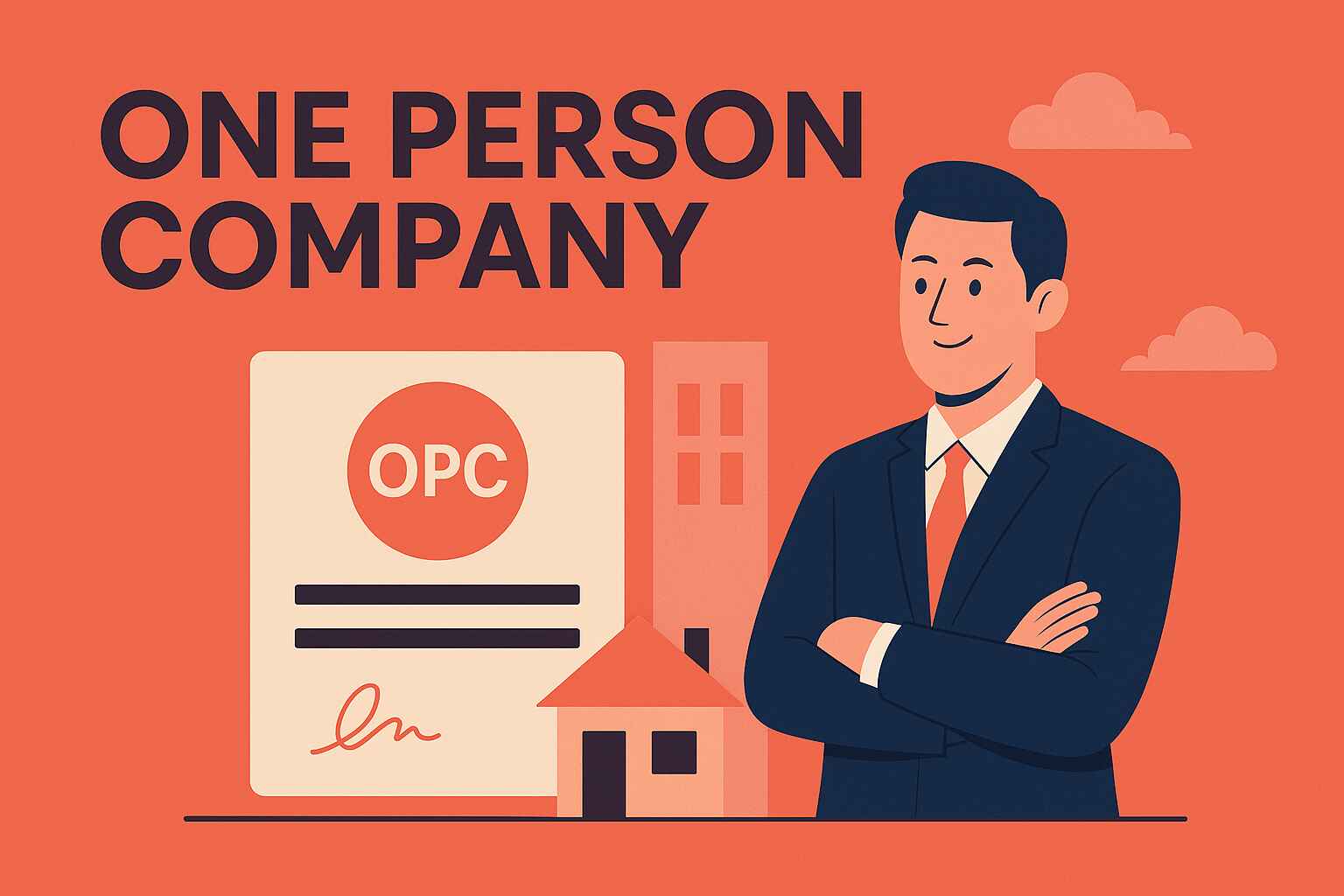One Person Company (OPC): Benefits and Registration Process

Strong 8k brings an ultra-HD IPTV experience to your living room and your pocket.
The startup revolution in India has witnessed a surge in individual entrepreneurs who aspire to run companies single-handedly. Traditionally, starting a company required at least two directors and members. However, the concept of a One Person Company (OPC) introduced under the Companies Act, 2013 has changed the landscape for solo entrepreneurs. An OPC allows a single individual to own and manage a corporate entity while enjoying limited liability and legal recognition.
This blog provides a comprehensive guide on what a one person company is, how OPC registration works, its benefits, eligibility, compliance requirements, and more. Whether you're planning to start your entrepreneurial journey or streamline your existing business, this guide is for you.
Understanding the Concept of a One Person Company
A one person company is a hybrid structure that combines the benefits of a sole proprietorship and a private limited company. It enables a single person to form a company with legal recognition.
This section introduces the framework of an OPC and how it differs from other business entities.
- An OPC is a type of private company with only one person as a member and shareholder.
- It is governed by Section 2(62) of the Companies Act, 2013.
- OPC provides limited liability protection to its owner, unlike a traditional sole proprietorship.
- It requires just one nominee, who will take over the business in case the owner dies or is incapacitated.
- Despite being a single-person structure, an OPC has a distinct legal identity.
- It’s best suited for entrepreneurs who want to enjoy the benefits of a company without the need for partners.
Key Features of a One Person Company
A one person company comes with a unique set of features that make it attractive to entrepreneurs.
This section outlines the distinguishing attributes that define an OPC.
- Only one person can be a member of an OPC, though they must nominate a successor.
- It enjoys a separate legal identity and perpetual succession, irrespective of the owner's status.
- The director and shareholder can be the same person.
- The liability of the owner is limited to their shareholding.
- OPCs can have a paid-up capital of up to ₹50 lakh and an annual turnover of up to ₹2 crore to retain OPC status.
- Conversion to a private limited company is mandatory if revenue crosses the prescribed limits.
Benefits of Registering a One Person Company
There are several benefits of OPC registration that make it a favorable option for solo entrepreneurs.
This section highlights the top advantages of registering a one person company in India.
- Limited Liability Protection: The personal assets of the owner are protected from company liabilities.
- Ease of Management: A single person manages operations and decisions, making processes simpler.
- Corporate Recognition: It offers a formal business structure, making it easier to access funding and loans.
- Tax Benefits: OPCs are taxed at a flat rate of 22% under new regimes, with no dividend distribution tax.
- Single Ownership: Full control remains with the owner, while enjoying the benefits of a company.
- No Minimum Capital Requirement: OPCs can be formed with any amount of capital investment.
Eligibility Criteria for OPC Registration
Before initiating OPC registration, it’s important to understand who qualifies to start a one person company.
This section covers the eligibility norms as per Indian corporate law.
- Only Indian citizens residing in India (for at least 120 days during the previous financial year) can incorporate an OPC.
- A person can form only one OPC at a time, either as a member or nominee.
- Minors, foreign nationals, and non-resident Indians are not eligible.
- Nominees must also be an Indian resident and give written consent.
- The proposed company must be for lawful purposes only.
- Professionals, freelancers, and consultants often benefit from this model.
Documents Required for OPC Registration
Proper documentation ensures a smooth and hassle-free OPC registration process.
In this section, we list the key documents required for setting up a one person company.
- PAN card and Aadhaar card of the sole member and nominee.
- Passport-size photographs of the member and nominee.
- Address proof such as utility bills or bank statements (not older than 2 months).
- Proof of registered office address (rent agreement, NOC from owner).
- Digital Signature Certificate (DSC) of the director.
- Director Identification Number (DIN) to be obtained during the incorporation process.
Step-by-Step Process for OPC Registration
The process for OPC registration is straightforward if you follow the correct procedure.
Here’s a step-by-step breakdown of registering a one person company in India.
- Step 1: Get DSC and DIN – The sole member/director must apply for a Digital Signature Certificate and Director Identification Number.
- Step 2: Choose a Company Name – File the name reservation application (SPICe+ Part A) on the MCA portal.
- Step 3: Draft MOA and AOA – Memorandum and Articles of Association must be prepared to define business objectives and rules.
- Step 4: File Incorporation Form – Complete the SPICe+ Part B along with e-MOA, e-AOA, AGILE-PRO-S for GST, EPF, ESIC registration.
- Step 5: Obtain PAN & TAN – Once approved, the Certificate of Incorporation is issued along with PAN and TAN numbers.
- Step 6: Open Bank Account – Use incorporation documents to open a current account in the company’s name.
Compliance Requirements for a One Person Company
Despite its simplified nature, a one person company must follow certain compliance rules.
Let’s explore the key post-registration requirements for an OPC.
- Maintain proper books of accounts and prepare annual financial statements.
- Appoint an auditor within 30 days of incorporation.
- File annual returns and financial statements with the Registrar of Companies (RoC).
- Hold board meetings at least twice a year (minimum gap of 90 days).
- Pay income tax at applicable rates and file ITR every year.
- File MSME and GST returns if applicable, based on the nature of business.
Differences Between OPC and Other Business Structures
Comparing a one person company with other popular structures helps in making an informed decision.
This section outlines how an OPC stands out from sole proprietorships and private limited companies.
- Unlike sole proprietorships, OPC has limited liability and separate legal identity.
- A private limited company requires at least two directors and shareholders; OPC only one.
- In a partnership, decision-making is shared, whereas OPC offers complete control to the owner.
- Regulatory compliance is lighter than private limited but heavier than proprietorship.
- OPC is suitable for individual startups, while private limited is apt for larger teams.
- Tax filing and audits are easier in OPCs compared to partnership firms or LLPs.
Situations Where an OPC Is the Right Choice
Knowing when to opt for a one person company can save time, cost, and legal hassles.
Explore scenarios where OPC registration is most beneficial.
- When an individual wants to start a scalable business alone without partners.
- Professionals like architects, consultants, or freelancers seeking legal recognition.
- Innovators and tech founders launching new products or services.
- Entrepreneurs with limited capital who want corporate benefits without complexity.
- Individuals who want to limit personal liability while running a business.
- People seeking easy conversion to private limited once the business grows.
Limitations of a One Person Company
Every business model comes with its own set of drawbacks, and so does the one person company.
Here are some practical limitations associated with OPC registration.
- Only one person can be a member, limiting fundraising and equity options.
- If turnover exceeds ₹2 crore or paid-up capital crosses ₹50 lakh, OPC must convert to private limited.
- Not suitable for businesses planning to attract venture capital or equity investment.
- Cannot carry out Non-Banking Financial Investments or investment activities.
- Some states levy higher compliance fees compared to sole proprietorships.
- Limited decision-making perspectives due to single ownership.
Conclusion
A One Person Company (OPC) is an ideal structure for solo entrepreneurs who want the legal protection and prestige of a corporate identity without the complications of managing multiple stakeholders. From easy OPC registration to clear benefits like limited liability, ease of management, and enhanced credibility, an OPC can be a stepping stone for aspiring business owners in India.
However, like any business model, it’s crucial to weigh the pros and cons before taking the plunge. If you are a solo founder looking for a professional yet flexible structure, then a one person company may just be the right fit for you. As your business expands, transitioning from OPC to a private limited company can open new avenues for growth.
Embrace the future of solo entrepreneurship with a structure that supports your vision, protects your liability, and simplifies your operations. Start your journey with an OPC today and take control of your business with confidence and clarity.
Note: IndiBlogHub features both user-submitted and editorial content. We do not verify third-party contributions. Read our Disclaimer and Privacy Policyfor details.





